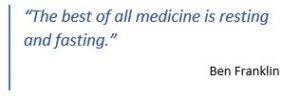By: Dr. Eli Andersen, Doctor of Naturopathic Medicine at Rinehart Clinic
When I introduce the idea of fasting with the goal of wellness in mind, some people may be confused. Isn’t a balanced nutritional diet important? Absolutely. And so is balance in all your body’s systems.
Fasting is one approach, among many, to find that balance.

My practice is based on the core principle of Naturopathic Medicine: Vis Medicatrix Naturae, The Healing Power of Nature, meaning that the human body has a natural ability to heal itself. Fasting is very much in line with this as it can help the body find balance and supports healing.
First, a little bit about what a fast is. Merriam-Webster defines fasting as “abstaining from food;” in other words, choosing to not eat food. My definition of fasting is “the opposite of being in a fed state (unfed state).” The science of how fasting works is complex and would take up more room than we can fit in this article, but the bottom line? After a period of time in an unfed state, the body switches from its normal energy source (glucose) and begins to use stored fats as energy since there is limited glucose available in the body from lack of eating; this process is called ketosis. Along with burning fats, in the unfed state, the body is also able to identify cells that are no longer working in the right way and returns itself to a healthier state through a process called “autophagy.” Autophagy starts after 13-18 hours of fasting. At the 24-hour fasting point, autophagy increases significantly.
Fasting has been used throughout human history in times of illness in order to support healing; it also happens universally in the animal kingdom. Scientific research on the benefits of fasting is still in the early stages, but we know from early studies (and from human and natural history) that fasting may be a way to eliminate waste, support the body in its own self-repair, and improve the function of immune cells. All of which could positively impact your health as you age!
Two common types of fast:
-A Short Fast (also known as Intermittent Fast) means eating no food for a block of 12 or more hours in a 24-hour period. A typical short fast might last 16-20 hours with a time blocks (i.e. 4-8 hours) for eating each day. Short fasts can be helpful for weight loss, improved lean muscle mass, improved mental sharpness, improved healing, reducing inflammation in the body, and decreasing sugar and insulin in the blood.
-A Prolonged Fast, best performed with guidance from one’s healthcare provider, can range from 24 hours to several days (or more) and generally leads to more noticeable benefits as you increase the length of the fast. Prolonged fasts may be helpful for chronic diseases, including high blood pressure, type 2 diabetes, insulin resistance, high cholesterol, autoimmune diseases, arthritis, skin conditions like eczema or psoriasis, gastro-intestinal conditions, mental health conditions, and cancer.

One of my patients, who happens to be a Registered Nurse, has been fasting twice a month for the last several months as part of her focus on a healthier lifestyle. After we initially discussed it, she researched more on her own. “After learning more about fasting, the idea just made sense to me, knowing what I know about the body’s ability to heal itself,” she said. “I look at it as a way to let my body rest and my cells rejuvenate. Plus, I have more energy!” Her most recent labs also show improvements in triglyceride and cholesterol levels.
If you would like to learn more about fasting, I will hold a workshop again this fall as part of Rinehart Clinic’s Community Wellness programming. (Dates for the Workshop on Fasting have not been set, but if you are interested in attending, sign up for Rinehart Clinic’s eNewsletter at www.rinehartclinic.org/news or follow us on Facebook for details as they become available.)
As with all health-related routines, if you plan to conduct a fast, you will want to check with your primary care provider first to make sure it fits your particular health care needs.

